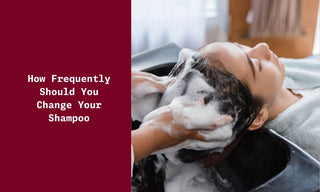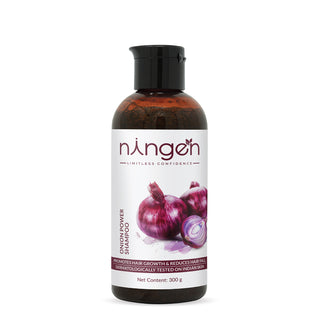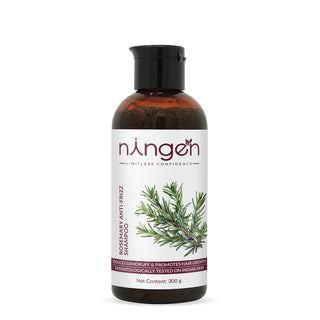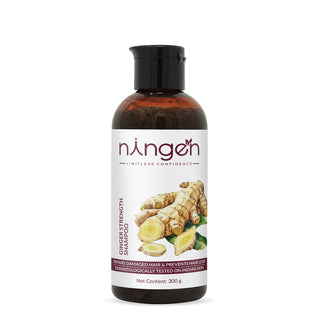आपका पसंदीदा शैम्पू पहले जैसा असर नहीं दिखा रहा—आपके बाल सुस्त, फ्लैट, या कुछ अलग से लगने लगते हैं, तो इसका मतलब है कि क्या अब समय आ गया है अपने शैम्पू को बदलने का? इस ब्लॉग में हम आपको बताएंगे कि आपको कितनी बार शैम्पू बदलना चाहिए, ऐसे संकेत जो ये बताते हैं कि शैम्पू बदलाव का वक्त आ गया है, और कुछ टिप्स जिनसे आपके बाल अच्छे और हेल्दी हो सकते है !
In This Article;
- आपको अपना शैम्पू बदलने की जरूरत क्यों होती है?
- शैम्पू बदलने का समय कब आता है?
- आपको अपने शैम्पू को कितनी बार बदलना चाहिए?
- बालों के लिए सही शैम्पू कैसे चुनें?
- क्या आपको शैम्पू बदलना चाहिए या एक ही शैम्पू पर टिके रहना चाहिए?
- शैम्पू बदलने के बीच स्वस्थ बालों को बनाए रखने के लिए टिप्स
- फाइनल थॉट
- त्वरित नजरिया
- अक्सर पूछे जाने वाले सवाल
आपको अपना शैम्पू बदलने की जरूरत क्यों होती है?
शैम्पू को बदलना कई कारणों से हो सकता है। मौसम, डाइट, और हेल्थ जैसी चीजों के कारण बालों और स्कैल्प की कंडीशन बदल सकती है, जिससे बालों की जरूरतें भी बदल जाती हैं।
अगर आपका वर्तमान शैम्पू अब पहले जैसा रिजल्ट नहीं दे रहा, जैसे कि शाइन, मॉइस्चर, या वॉल्यूम, तो बदलाव करना जरूरी है।
लोग शैम्पू भी तब बदलते हैं जब उन्हें खास समस्या जैसे डैंड्रफ, कलर-ट्रीटेड हेयर, या डैमेज के लिए सॉल्यूशन चाहिए होता है।
पर्सनल प्रेफरेंसेस और बदलते हेयर ट्रेंड्स भी शैम्पू बदलने का कारण बन सकते हैं, ताकि वो आपके वर्तमान लाइफस्टाइल या एस्थेटिक से बेहतर मेल खा सके।
शैम्पू बदलने का समय कब आता है?
अपने शैम्पू को बदलना स्वस्थ बालों और स्कैल्प को बनाए रखने के लिए जरूरी हो सकता है। ये जानना कि कब शैम्पू बदलना चाहिए, कई फैक्टरों पर निर्भर करता है, जैसे बालों की बनावट से लेकर मौसम के प्रभाव तक। यहां कुछ संकेत दिए गए हैं जिन्हें आपको ध्यान में रखना चाहिए।
बालों की बनावट में बदलाव
अगर आप महसूस करते हैं कि आपके बाल टूटने लगे हैं, ड्राई हो गए हैं, या जरूरत से ज्यादा ऑयली हो गए हैं, तो यह समय हो सकता है कि आप अपने शैम्पू को फिर से जांचें। अलग-अलग बालों की बनावट, जैसे कि कर्ली हेयर, को उनकी नैचुरल बैलेंस बनाए रखने के लिए अलग देखभाल की जरूरत होती है, ताकि डैमेज से बचा जा सके।
स्कैल्प हेल्थ के मुद्दे
क्या आपको ड्राईनेस, फ्लेकी स्कैल्प या लगातार खुजली हो रही है? ये लक्षण शैम्पू बदलने का संकेत हो सकते हैं। ऐसे प्रोडक्ट्स जो खास स्कैल्प इरिटेशन को टार्गेट करते हैं या सेंसिटिव स्कैल्प के लिए होते हैं, वे स्कैल्प की हेल्थ को सुधारने में मदद करते हैं।
मौसमी प्रभाव
मौसम का बदलाव आपके बालों की जरूरतों को प्रभावित कर सकता है। सर्दियों में आपके बालों को हाइड्रेटिंग शैम्पू की जरूरत होती है, जबकि गर्मी में हल्का शैम्पू ज्यादा अच्छा हो सकता है, ताकि ओयली स्कैल्प और एक्सेस सीबम प्रोडक्शन को कंट्रोल किया जा सके।
स्पेसिफिक स्कैल्प कंडीशन्स
डैंड्रफ या ड्राई स्कैल्प जैसी समस्याएं मेडिकेटेड या सल्फेट-फ्री शैम्पू की मांग कर सकती हैं। अगर आप देख रहे हैं कि आपका वर्तमान शैम्पू इन समस्याओं को ठीक करने में मदद नहीं कर रहा, तो बदलाव जरूरी होता है।
हाल की हेयर ट्रीटमेंट का प्रभाव
कलर-ट्रीटेड बाल या उन बालों के लिए जो कैमिकल ट्रीटमेंट से गुजर चुके हैं, उन्हें स्पेशल शैम्पू की जरूरत होती है जो कलर को प्रिजर्व करें और डैमेज को रिपेयर करें। ऐसे शैम्पू में निवेश करना आपके बालों को आगे और नुकसान से बचा सकता है।
हार्मोनल फ्लक्चुएशंस और हेयर केयर
हार्मोनल बदलाव, जैसे गर्भावस्था या मेनोपॉज, आपके बालों की कंडीशन को प्रभावित कर सकते हैं। इन समय में, आपके हेयर केयर रूटीन को सही शैम्पू से एडजस्ट करना बालों की हेल्थ को बनाए रखने में मदद करता है, खासकर बालों के झड़ने या बढ़े हुए ऑयल प्रोडक्शन जैसी समस्याओं को ठीक करने में।
आपको अपने शैम्पू को कितनी बार बदलना चाहिए?
इसका कोई सख्त नियम नहीं है कि आपको कितनी बार शैम्पू बदलना चाहिए, क्योंकि यह आपके बालों के प्रकार, लाइफस्टाइल और खास बालों की समस्याओं पर निर्भर करता है। हालांकि, कई विशेषज्ञ यह सुझाव देते हैं कि सर्वोत्तम परिणामों के लिए हर कुछ महीनों में शैम्पू बदलते रहना चाहिए।
उदाहरण के लिए, अगर आप बिल्डअप को हटाने के लिए क्लैरिफाइंग शैम्पू का उपयोग कर रहे हैं, तो ठंडी महीनों में जब बाल सूखने लगते हैं, तो आपको एक ज्यादा मॉइस्चराइजिंग शैम्पू की आवश्यकता हो सकती है। इसी तरह, अगर आपको लगता है कि आपका शैम्पू पहले जैसी चमक या वॉल्यूम नहीं दे रहा है, तो यह समय हो सकता है नया शैम्पू इस्तेमाल करने का।
आमतौर पर, यह अच्छा है कि आप अपने बालों को समझें—अगर वे बेजान, फ्लैट या रूखे लगने लगें, तो यह नए शैम्पू का समय हो सकता है। कुछ अच्छे शैम्पूज़ के बीच बारी-बारी से बदलाव करने से आपके बाल संतुलित, स्वस्थ और अच्छे दिख सकते हैं।
अगर आप एक ही शैम्पू लंबे समय तक इस्तेमाल करते हैं, तो यह आपके बालों को सीधे नुकसान नहीं पहुँचाता। लेकिन, समय के साथ शैम्पू उतना प्रभावी नहीं रह सकता। प्रोडक्ट बिल्डअप के कारण बाल भारी या सुस्त महसूस हो सकते हैं। जब आपके बालों की जरूरतें बदलती हैं, जैसे मौसम, उपचार या उम्र बढ़ने के कारण, तो आपका मौजूदा शैम्पू सही मॉइश्चर या क्लींजिंग बैलेंस नहीं दे पाता। कभी-कभी शैम्पू को बदलना अच्छा होता है, ताकि बाल ताजे, स्वस्थ और बदलती जरूरतों के अनुसार प्रतिक्रिया दे सकें।
बालों के लिए सही शैम्पू कैसे चुनें?
सही शैम्पू आपके बालों के प्रकार और समस्याओं पर निर्भर करता है। यह है कैसे आप अपने बालों के लिए सही शैम्पू चुन सकते हैं:
ऑयली बालों के लिए: ऐसे शैम्पू ढूंढें जो क्लैरिफाइंग या वॉल्यूमाइजिंग हों, जो अतिरिक्त तेल को हटाकर स्कैल्प को ताजगी दे। भारी मॉइश्चराइजिंग फॉर्मूलेशन से बचें, क्योंकि वे बालों को और अधिक भारी बना सकते हैं।
सूखे या क्षतिग्रस्त बालों के लिए: ऐसे शैम्पू चुनें जो हाइड्रेटिंग हों, जिनमें तेल, शीया बटर या केरेटिन हो, जो नमी को बहाल करें और बालों को मजबूत करें।
घुंघराले बालों के लिए: सल्फेट-फ्री शैम्पू का चुनाव करें, जो हाइड्रेटिंग और कर्ल-एन्हांसिंग हो, जो घुंघराले बालों को परिभाषित करें और फ्रिज को रोकने में मदद करें।
बारीक बालों के लिए: हल्के वॉल्यूमाइजिंग शैम्पू ढूंढें जो बालों को बिना चिपचिपा या सपाट महसूस किए शरीर दे।
रंगीन बालों के लिए: रंग-प्रोटेक्टिंग शैम्पू का उपयोग करें, जो बालों को कोमल रखें और रंग की चमक को बनाए रखें।
क्या आपको शैम्पू बदलना चाहिए या एक ही शैम्पू पर टिके रहना चाहिए?
शैम्पू बदलना फायदेमंद हो सकता है, लेकिन यह आपके बालों के प्रकार और जरूरतों पर निर्भर करता है।
शैम्पू क्यों बदलें: शैम्पू को बदलने से बालों की अलग-अलग जरूरतों को पूरा किया जा सकता है, जैसे प्रोडक्ट बिल्डअप को हटाना या हाइड्रेशन। उदाहरण के लिए, एक बार हफ्ते में क्लैरिफाइंग शैम्पू का उपयोग करना आपके स्कैल्प को साफ रख सकता है, जबकि हाइड्रेटिंग शैम्पू सूखे बालों के छोर को पोषण दे सकता है।
कब एक ही शैम्पू पर टिके रहें: अगर आपकी कोई खास समस्या है, जैसे रंग-रंगीन (कलर्ड) या संवेदनशील (सेंसेटिव) बाल, तो एक विशेष शैम्पू का इस्तेमाल करना बेहतर हो सकता है, ताकि आपके बालों की स्थिति बनी रहे। ये शैम्पू आपके बालों को बचाने और उनकी देखभाल करने के लिए बने होते हैं।
शैम्पू बदलने के बीच स्वस्थ बालों को बनाए रखने के लिए टिप्स
कभी-कभी क्लैरिफाइंग शैम्पू का उपयोग करें: प्रोडक्ट बिल्डअप से बचने के लिए, हर कुछ हफ्तों में एक बार क्लैरिफाइंग शैम्पू का उपयोग करें। यह आपके स्कैल्प और बालों की ताजगी और साफ-सफाई बनाए रखता है, बिना आपके स्क्लेप के नेचुरल आयल को हटाएँ ।
नियमित रूप से कंडीशनर का उपयोग करें: चाहे कोई भी शैम्पू इस्तेमाल करें, हमेशा अपने बालों के प्रकार के अनुसार कंडीशनर का उपयोग करें, ताकि हाइड्रेशन लॉक हो सके और ड्राई न हो ।
हीट स्टाइलिंग को कम करें: अधिक हीट स्टाइलिंग समय के साथ आपके बालों को नुकसान पहुँचाती है। एयर ड्राइंग करने की कोशिश करें या हीट प्रोटेक्शन स्प्रे का उपयोग करें जब आप ब्लो ड्रायर या स्ट्रेटनर जैसे टूल्स का उपयोग करें।
अपने स्कैल्प की मसाज करें: धोने के दौरान अपने स्कैल्प की मसाज करने से रक्त संचार बेहतर होता है, जिससे बालों को फ्रैशनेस मिलती है ।
नियमित रूप से ट्रिम करें: अपने बालों के छोर को स्वस्थ रखने के लिए नियमित ट्रिम करवाएं, ताकि स्प्लिट एंड्स और ब्रेकेज से बचा जा सके, और शैम्पू बदलने के बीच आपके बाल अच्छे दिखें।
फाइनल थॉट
शैम्पू बदलना आपके बालों को स्वस्थ, ताजगी से भरपूर और बदलती जरूरतों के हिसाब से प्रतिक्रिया करने में मदद कर सकता है। हालांकि यह कोई कड़ा नियम नहीं है कि आपको कितनी बार शैम्पू बदलना चाहिए, लेकिन बालों की बनावट में बदलाव, बिल्डअप, या स्कैल्प समस्याओं जैसे संकेतों पर ध्यान देना आपको सही दिशा में मार्गदर्शन करेगा। चाहे आप अपने बालों के विशेष लक्ष्यों के लिए शैम्पू बदलते हैं या एक ही शैम्पू पर टिके रहते हैं, नियमित कंडीशनिंग, ट्रिमिंग और कभी-कभी क्लैरिफाइंग उपचार के साथ संतुलित रूटीन बनाए रखना आपके बालों को सबसे अच्छे तरीके से दिखायेगा।
त्वरित नजरिया
आपको शैम्पू कितनी बार बदलना चाहिए, यह आपके बालों के टाइप्स और जरूरतों पर निर्भर करता है। यदि आपके बाल हलके, चिपचिपे ड्राई फ़ील करते हैं, तो शायद शैम्पू बदलने का समय आ गया है। हर कुछ महीनों में शैम्पू बदलने से बिल्डअप को रोका जा सकता है और मौसमी या उपचार संबंधी बदलावों को ध्यान में रखा जा सकता है। अपने बालों के प्रकार (ऑयली, ड्राई, कलर-ट्रीटेड, आदि) के आधार पर प्रोडक्ट्स चुनें और नियमित कंडीशनिंग, स्कैल्प मसाज और ट्रिमिंग से अपने स्कैल्प को स्वस्थ रखें।
अक्सर पूछे जाने वाले सवाल
Q1. मुझे अपना शैम्पू कितनी बार बदलना चाहिए?
इसका कोई फ़िक्सड रूल नहीं है, लेकिन कई विशेषज्ञ हर कुछ महीने में शैम्पू बदलने की सलाह देते हैं। अपने बालों की बनावट और स्थिति पर ध्यान दें—अगर आपके बाल सुस्त, फ्लैट या अनकंट्रोल महसूस करते हैं, तो शायद शैम्पू बदलने का समय है।
Q2. शैम्पू को कभी-कभी बदलना क्यों जरूरी है?
समय के साथ, शैम्पू आपके स्कैल्प पर बिल्डअप कर सकता है, जिससे इसकी प्रभावशीलता कम हो जाती है। शैम्पू बदलने से बालों की बदलती जरूरतें जैसे सूखापन, ऑयलीनेस या प्रोडक्ट बिल्डअप को सही किया जा सकता है, जिससे आपके बाल स्वस्थ और चमकदार रहते हैं।
Q3. क्या एक ही शैम्पू का इस्तेमाल ज्यादा समय तक करने से बालों को नुकसान हो सकता है?
एक ही शैम्पू का लंबे समय तक इस्तेमाल करने से आपके बालों को सीधे नुकसान नहीं होता, लेकिन यह एक्सपेक्टेड परिणाम नहीं दे सकता। बिल्डअप और बदलती बालों की जरूरतों के कारण बाल चिकने, सूखे या सुस्त महसूस कर सकते हैं।
Q4. मुझे शैम्पू बदलने की जरूरत होने के संकेत क्या हैं?
अगर आपके बाल सूखे, चिकने, मुर्झायें या वॉल्यूम में कमी महसूस करते हैं, तो यह संकेत हो सकता है कि आपका शैम्पू उतना प्रभावी नहीं हो रहा।
Q5. क्या बालों का प्रकार शैम्पू बदलने की आवृत्ति को प्रभावित करता है?
जी हां, अलग-अलग बालों के प्रकार की अलग-अलग जरूरतें होती हैं। ऑयली बालों को ऑइल के बिल्डअप को नियंत्रित करने के लिए ज्यादा बार शैम्पू बदलने की आवश्यकता हो सकती है, जबकि सूखे या घुंघराले बालों को मॉइश्चराइजिंग और क्लैरिफाइंग शैम्पू के बीच बारी-बारी से इस्तेमाल करने का फायदा हो सकता है।
Q6. क्या मुझे शैम्पू बदलना चाहिए या एक ही शैम्पू पर टिके रहना चाहिए?
शैम्पू बदलना अलग-अलग बालों की जरूरतों जैसे हाइड्रेशन, वॉल्यूम या बिल्डअप को साफ करने में मदद कर सकता है। हालांकि, अगर आपके पास कोई विशेष समस्या है जैसे कलर-ट्रीटेड बाल, तो आपको लगातार देखभाल के लिए एक विशेष शैम्पू पर टिके रहना चाहिए।
Q7. अपने बालों के प्रकार के लिए सही शैम्पू कैसे चुनें?
ऑयली बालों के लिए क्लैरिफाइंग या वॉल्यूमाइजिंग शैम्पू लाभकारी होते हैं, जबकि ड्राई या डैमेज बालों को हाइड्रेटिंग फॉर्मूलेशन की आवश्यकता होती है। घुंघराले बाल सल्फेट-फ्री, मॉइश्चराइजिंग उत्पादों से बेहतर बढ़ते हैं, और कलर्ड बालों को कलर-सुरक्षित शैम्पू की आवश्यकता होती है।
Q8. मैं अपने स्कैल्प पर प्रोडक्ट बिल्डअप को कैसे रोक सकता हूं?
बिल्डअप से बचने के लिए, हर कुछ हफ्तों में एक बार क्लैरिफाइंग शैम्पू का उपयोग करें। आप अपने बालों को धोते समय नियमित रूप से स्कैल्प की मसाज भी कर सकते हैं, ताकि रक्त संचार उत्तेजित हो और प्रोडक्ट को साफ करने में मदद मिले।
Q9. कलर-ट्रीटेड बालों के लिए कौन सा शैम्पू सबसे अच्छा है?
कलर-ट्रीटेड बालों के लिए सौम्य, रंग-सुरक्षित शैम्पू की आवश्यकता होती है, जो आपके रंग की रक्षा करते हुए आपके बालों को पोषण दें। सल्फेट-फ्री फॉर्मूलेशन ढूंढें, ताकि कलर और हाइड्रेशन को आपके बालों से रहे ।
Q10. मुझे अपने बालों को साफ रखने के लिए क्लैरिफाइंग शैम्पू कितनी बार इस्तेमाल करना चाहिए?
क्लैरिफाइंग शैम्पू का उपयोग हर 2-4 हफ्तों में करें, यह आपके बालों के प्रकार और स्टाइलिंग प्रोडक्ट्स के यूज़ पर निर्भर करता है। क्लैरिफाइंग शैम्पू का अधिक इस्तेमाल करने से आपके बालों से प्राकृतिक तेल हट सकते हैं, इसलिए इसका लिमिटेड उपयोग करें।











